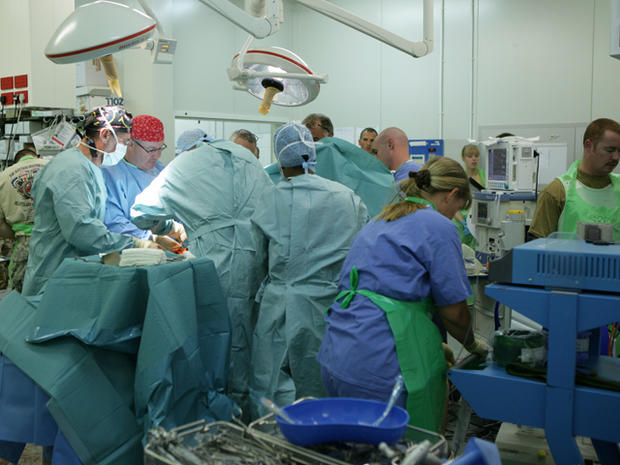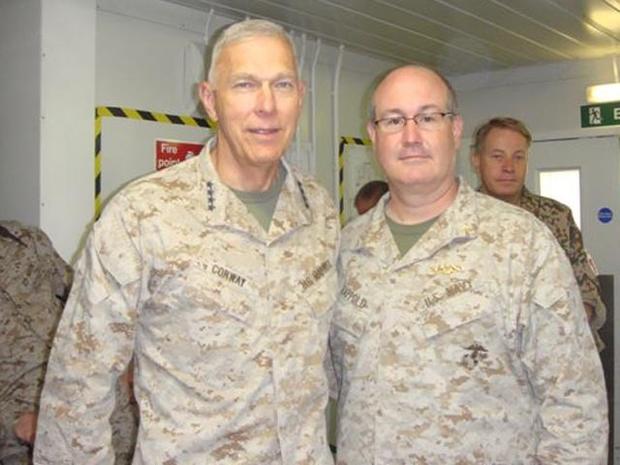Navy surgeon saves lives in Afghanistan, Iraq
Readers at CBSNews.com were asked to nominate their heroes for Veterans Day. If you know a hero, whether for conduct during a war or after, submit the detailshere.
Even as a trauma surgeon, U.S. Navy Capt. Joseph Rappold was not fully prepared for the kinds of devastating injuries he encountered in Afghanistan and Iraq, the terrible damage done by the improvised explosive devices, or IEDs, that marked the wars.
"I think when you see one of these wounded in front of you for the first time it's like, jeez where do you start," he said.
But quickly, his training took over and although he never became numb, as a surgeon on the front line, he did compartmentalize the bloodshed around him, he said.
"We have a whole generation of surgeons now in the military that I don't think there's much that they can see that fazes them any more," he said. "But certainly the first time you see it, it clearly leaves an impression on your mind."
Rappold, 53, retired from the military in January 2012, after seven deployments as a medical corps officer to Afghanistan and Iraq. He was in Afghanistan with the 15th Marine Expeditionary Unit soon after the Sept. 11, 2001, attacks and in Iraq in Baghdad, Balad, Mosul, Tikrit and in the fierce fighting in Ramadi in 2006. Two years later, he served as the director of the Joint Theater Trauma System, responsible for all surgical care in both wars. And then just when he thought he had come back to the United States for good, he was asked to return to war one more time in 2009, to the British field hospital at Camp Bastion in Afghanistan's Helmand province.
Connie Johnson knows Rappold through her work as a coordinator in the trauma program at the Landstuhl Regional Medical Center in Landstuhl, Germany. He saved many lives, but took his losses hard, she said.
"He was assigned to some of the busiest field hospitals where our service members were involved in surges with increased foot patrols and saw the worst of the worst," she said.
A greater number of foot patrols meant a greater chance of traumatic amputations and other devastating injuries, she said.
"It would be not unreasonable for us to get, in Iraq or Afghanistan, 20 casualties dropped on our doorstep or even in Afghanistan, 30, within 10 minutes," he said.
As of February, more than 6,600 members of the American military had died in Afghanistan and Iraq, according to a report from the Congressional Research Service. Another 50,000 had been wounded, with amputations the defining injury of the wars.
The size of the medical teams varied from some 300 general surgeons, orthopedic surgeons, a plastic surgeon and other personnel at the British field hospital in Afghanistan to a small unit in Ramadi consisting of just Rappold, an orthopedic surgeon, an anesthesiologist and several corpsmen. There the fighting was just outside the front gate, he said.
"And quite frankly, sometimes we were overwhelmed with the work," he said. "I think probably we could have done better by some these young men if we had had a little more help."
He admits to sometimes being scared. The doctors worked for hours without sleep, and in Iraq in particular they came under fire themselves, but Rappold said he would go back in instant if he were needed.
"It is truly a privilege above all others to care for these young men and women," he said. "I don't want to sound like a flag waver, but I guess I am. This is what I've done my entire life."
He and the other doctors cared for military personnel as well civilians and in accordance with the Geneva Convention, Iraqi and Afghan insurgents too. That did not always sit well with the American troops, he said. The most badly injured got treated first, he said.
"We took care of everybody that wandered through the door," he said. "If you got to us, we took care of you."
The wounds he remembers the best are the ones that were deadly, though he also recalls a young British soldier who had been shot in the right chest. The medical personnel were forced to remove his right lung and much of his liver, but he survived.
Rappold said that the challenge for military doctors will be to sustain what they have mastered as a result of the fighting in Afghanistan and Iraq - bringing the time for evacuation to surgical care down to less than an hour, transporting critically injured troops and advances in blood transfusions.
Now at Temple University's School of Medicine in Philadelphia, where he got his medical degree, the father of four is an associate professor in the department of surgery.
"He's a big man with an even bigger heart and he loves being a surgeon so he works a lot," Johnson said.

